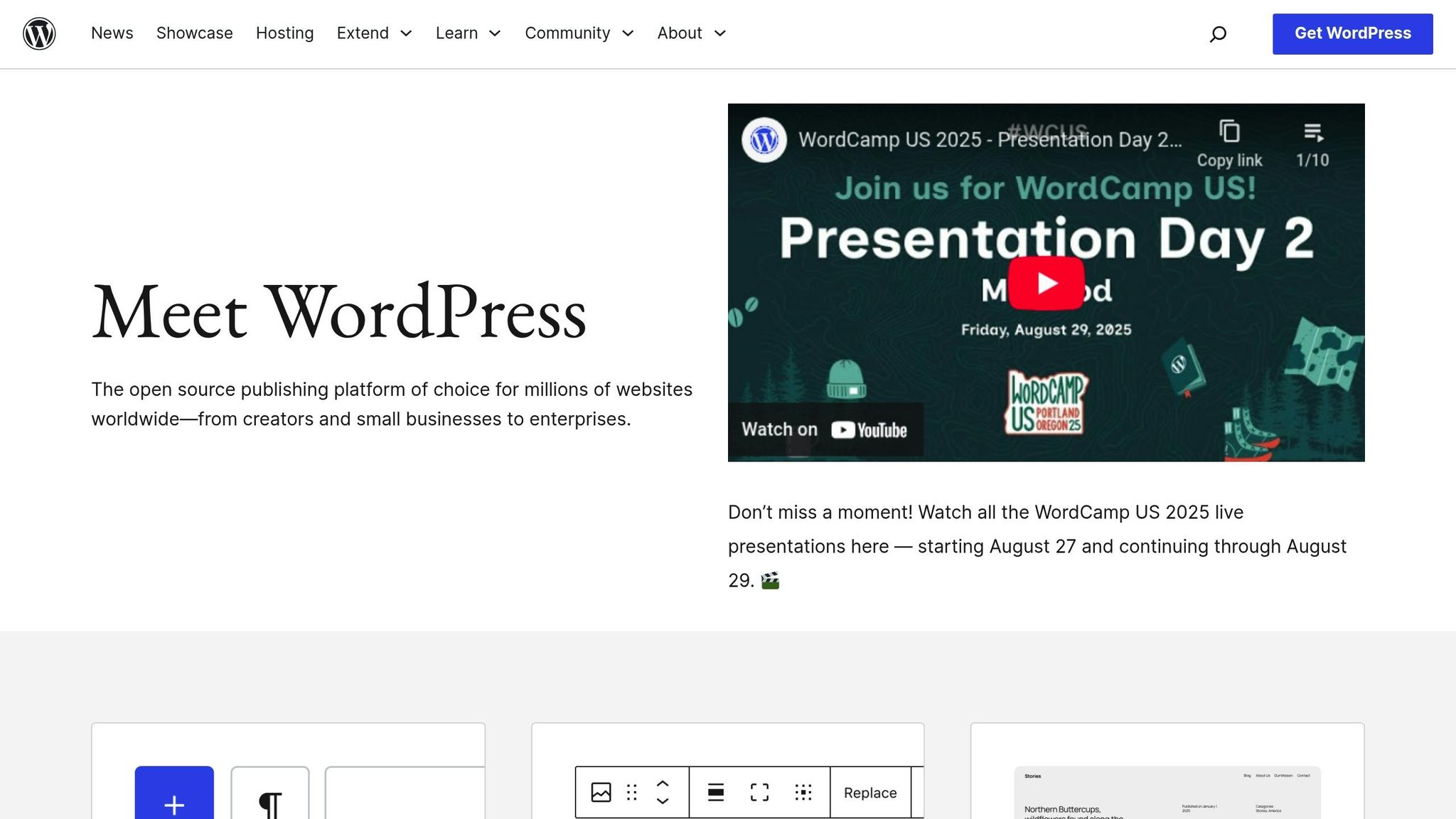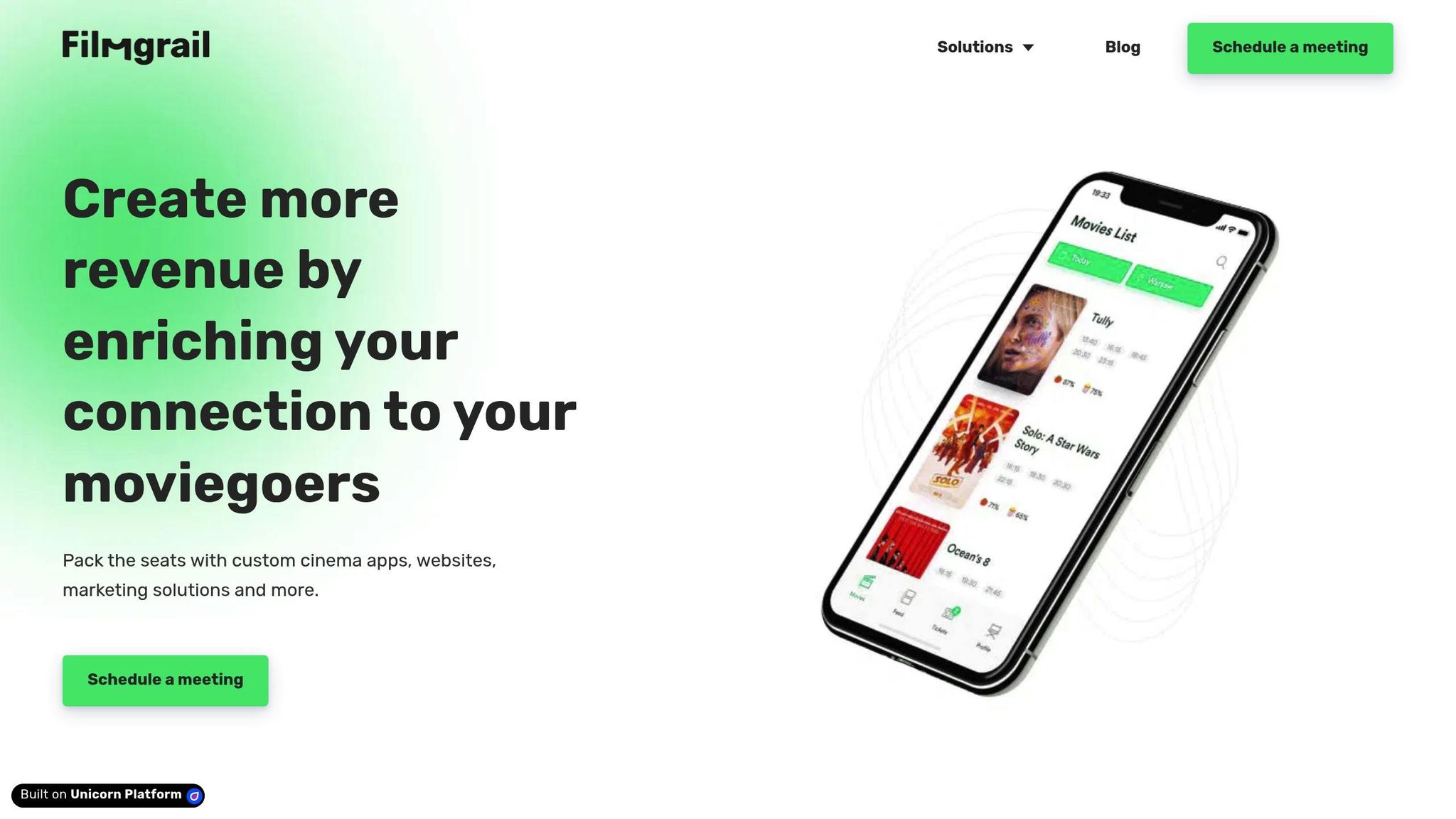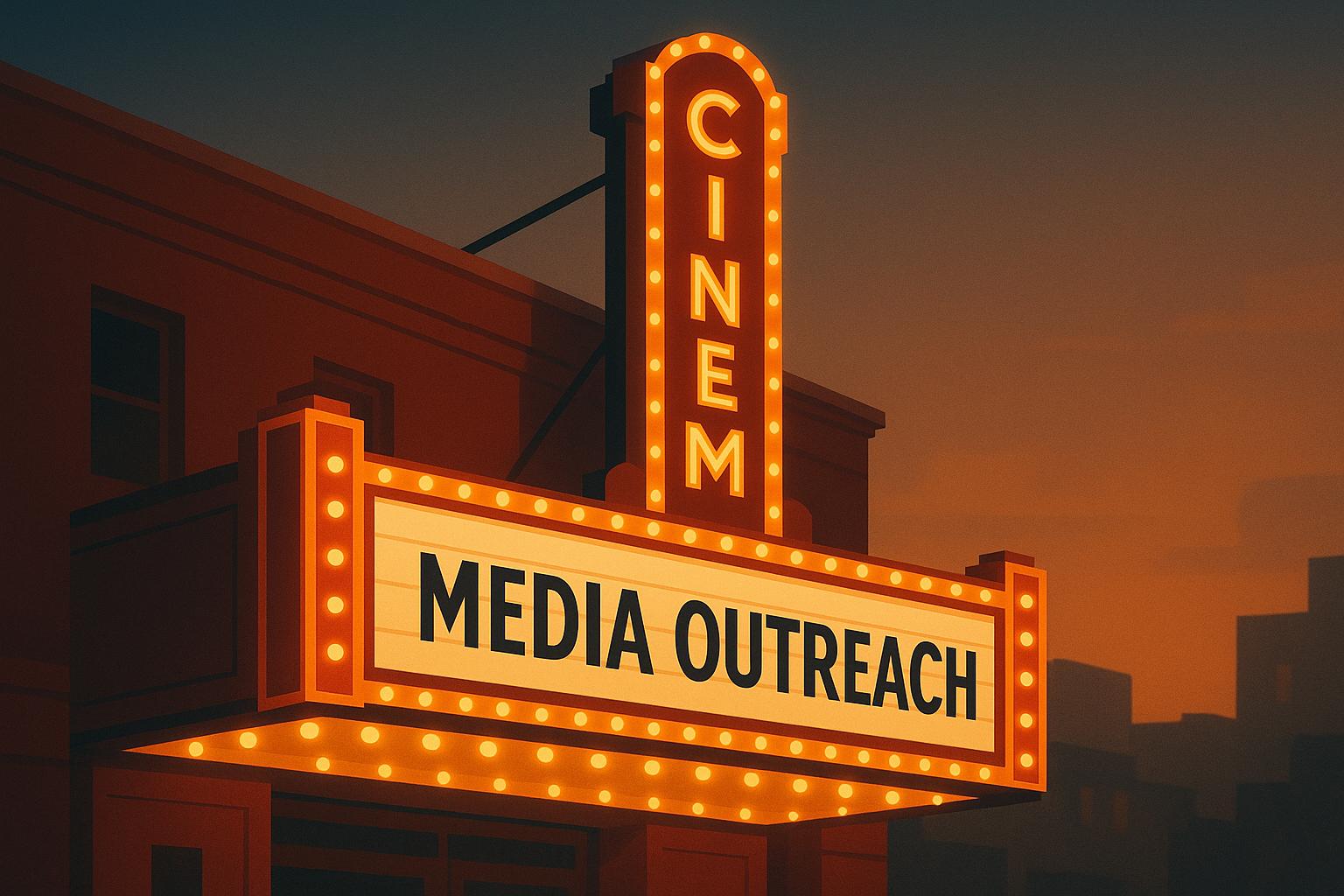Selecting the right cinema website template is essential for creating a user-friendly platform that supports ticket sales, showtime displays, and customer engagement. A good template should align with your cinema's needs, offer smooth navigation, and reflect your brand identity. Here's what to focus on:
- Core Features: Look for templates with integrated ticket purchasing, clear showtime displays, loyalty program support, and group booking options.
- Audience Needs: Ensure mobile responsiveness, accessibility features, and designs that cater to your audience's demographics and preferences.
- Performance: Prioritize fast loading speeds, cross-browser compatibility, and SEO-friendly features to improve visibility and usability.
- Customization: Choose templates that allow flexibility in color schemes, layouts, and branding to maintain a consistent identity.
- Future Scalability: Opt for templates that can adapt to added locations, services, or new integrations over time.
To avoid costly redesigns, involve your team and customers in the decision-making process to identify key features and pain points. Platforms like Filmgrail offer tailored solutions with integrated tools for managing cinema operations and customer engagement, making them a strong alternative to generic templates.
How To Design A WordPress Movie Website Using Free Elementor Template

Know Your Cinema Business and Audience Needs
Choosing the right website template for your cinema starts with understanding your business operations and audience preferences. A well-matched template can streamline your workflows and provide a seamless experience for your customers.
Check Your Cinema-Specific Requirements
Your cinema's unique characteristics should guide your template selection. For instance, independent theaters often focus on building local connections and showcasing curated films. In contrast, multiplex chains need robust systems to handle high-volume ticket sales across multiple screens and locations.
Consider the ticketing volume and operational complexity of your cinema. An art house theater with lower ticketing traffic has different needs than a bustling multiplex. Your website template should handle peak times smoothly, avoiding slowdowns or crashes.
Integration with existing systems is another key factor. Your template should work seamlessly with your POS, concession platform, and customer database to prevent operational hiccups and revenue loss.
Think about your content management needs. If your team frequently updates movie schedules, showtimes, or promotions, look for templates with user-friendly editing tools like drag-and-drop functionality. Some templates may offer more customization options but require technical expertise to manage.
Multimedia features are also worth considering. Cinemas hosting events like film festivals or live screenings might need templates that showcase video trailers, photo galleries, and event details prominently. Standard movie theaters, on the other hand, may prioritize clear showtime displays and streamlined booking systems.
Once you’ve assessed your cinema's needs, focus on aligning your website with your audience's expectations.
Know Your Audience
Understanding your moviegoers' demographics and online behavior is crucial for selecting the right template. Age groups interact with websites differently. Younger audiences expect fast-loading pages, mobile-friendly designs, and social media integration. Older patrons, however, often prefer larger text, straightforward navigation, and easy access to contact information.
Evaluate mobile usage trends in your area. If most of your audience uses smartphones, prioritize a mobile-optimized template. Families might prefer using tablets to browse showtimes at home, so ensure your site performs well across all devices.
Local preferences also play a big role. Urban theaters often attract tech-savvy customers who look for features like reserved seating, advance booking, and digital loyalty programs. Meanwhile, rural cinemas may find their customers value simpler booking options and clear phone contact details.
Think about your customers' journey on your site. Are they browsing to discover new movies, or do they know exactly what they want to see? For browsing customers, templates with prominent trailers and detailed movie descriptions work best. Returning patrons benefit from easy search tools and quick checkout options.
Finally, address accessibility needs in your community. Your template should support features like screen reader compatibility, proper contrast ratios, and clear details about accessible seating and assistive listening devices to ensure inclusivity.
Get Input from Your Team and Customers
Your staff interacts with your website daily and has firsthand knowledge of its strengths and weaknesses. Their insights can pinpoint common customer complaints and time-consuming administrative tasks.
Ask your team specific questions: What are the most frequent customer complaints about the site? What information do customers often call to ask about that should be easier to find online? These insights can help you identify must-have features for your new template.
Customer feedback is equally important. Regular moviegoers can tell you what they value most - whether it’s browsing by genre, showtime, or location. They can also share preferences for features like seat selection, group booking options, or loyalty program integration.
To refine your template criteria, gather feedback through surveys and usability tests. For example, ask team members who don’t typically use the site to complete tasks like finding showtimes or booking group tickets. Their challenges can highlight areas where your new template needs improvement.
Lastly, consider input from different customer segments. Families booking weekend matinees, couples planning date nights, and film buffs attending special screenings all have unique preferences. Make sure your website template caters to the needs of these diverse groups.
Key Features to Look for in Cinema Website Templates
When choosing a cinema website template, it's essential to focus on features that not only improve sales but also enhance customer loyalty. Here's a breakdown of the must-have functionalities to consider before diving into design and user experience.
Basic Functions for Cinema Websites
Showtime Displays
Clear, easy-to-navigate showtime displays are non-negotiable. Look for templates that allow users to filter showtimes by date, genre, and location, ensuring they can quickly find the movie that suits their schedule.
Integrated Ticket Purchasing Systems
A seamless ticket-buying experience is key. Your template should support secure payment options, easy seat selection, and instant booking confirmations. These features ensure a smooth and trustworthy process for your customers.
Loyalty Program Integration
Templates with built-in or compatible loyalty program features can help strengthen customer retention. Whether the system is integrated or designed to work with external tools, it should allow customers to view rewards and redeem them during checkout.
Content Management Capabilities
Keeping your site updated should be simple. Opt for templates with user-friendly admin panels so your team can easily add new movies, update showtimes, and post announcements without needing technical expertise.
Group Booking and Event Management
If your cinema hosts private screenings or events, choose a template that accommodates group bookings. Features like special pricing, custom seating arrangements, and dedicated event pages - along with calendar integrations and automated confirmations - can simplify the process.
Once these core features are in place, shift your focus to design and performance for a smooth user experience.
Design and Performance Requirements
Mobile Responsiveness
With many customers booking tickets on their phones, a mobile-friendly template is a must. Test templates on different screen sizes to ensure navigation is intuitive, text is readable, and the checkout process works flawlessly on smaller devices.
Fast Loading Speed
A slow website can drive users away. Choose templates optimized for speed through techniques like image compression, clean coding, and efficient database queries - especially important during high-traffic periods.
ADA Compliance
Accessibility matters. Your template should meet accessibility standards, including proper heading structures, alt text for images, keyboard navigation, and sufficient color contrast. Features like closed captioning for trailers can further enhance usability for all visitors.
Cross-Browser Compatibility
Your site should work seamlessly across all major browsers. Test templates on Chrome, Safari, Firefox, and Edge to ensure consistency - especially for critical functions like ticket purchasing.
Search Engine Optimization (SEO)
To help moviegoers find your cinema online, prioritize templates with built-in SEO tools. Look for clean URLs, customizable meta tags, and schema markup to boost your site's visibility in search results.
Customer Engagement and Marketing Features
Auto-Playing Trailers
Embedded trailers that auto-play (muted) can add a dynamic visual element to your site. Templates with this feature enhance the browsing experience without slowing down performance.
Review and Rating Systems
Built-in review features or integrations with local platforms allow customers to see feedback from other moviegoers. This added layer of trust can help users make informed decisions.
Personalized Recommendations
Templates with recommendation engines can drive ticket sales by suggesting movies based on customer preferences and viewing history. Personalization keeps users engaged and encourages repeat visits.
Email Marketing Integration
Capture email addresses during ticket purchases and connect with popular email marketing platforms. This allows you to send automated updates about new releases, promotions, or loyalty rewards.
Social Media Connectivity
Templates with social sharing buttons and integrated social feeds make it easy to share content and engage with your community. These features extend your promotional reach and encourage interaction.
Analytics and Tracking
Understanding customer behavior is crucial. Look for templates that integrate with tools like Google Analytics and support conversion tracking. Some even include dashboards to monitor trends, peak times, and customer demographics.
Template Customization and Flexibility Options
When it comes to building a cinema website, selecting a template that aligns with your brand and evolves alongside your business is key. A well-designed, customizable template ensures your site not only stands out visually but also functions smoothly as your needs grow.
Brand and Visual Identity Options
Your website should immediately reflect your brand identity. One of the most important elements to look for is color scheme flexibility. The best templates allow you to customize primary and secondary colors across the entire site - not just in isolated elements like headers or buttons. Consistency in your brand colors is essential, especially in critical areas like ticket purchase flows, promotional banners, and navigation menus.
Logo placement and sizing are equally important. Some templates limit your logo to a small header, while others give you the freedom to showcase it prominently. Make sure your logo is displayed clearly across all layouts, including on mobile devices, to strengthen brand recognition.
When it comes to typography, your options should go beyond basic font choices. Look for templates that support uploading custom fonts, especially if your brand uses specific typefaces. The ability to adjust font sizes, weights, and spacing ensures your website aligns with your offline marketing materials, creating a seamless brand experience across all channels.
Layout flexibility is another must-have. Templates with drag-and-drop builders or modular sections let you rearrange content easily, giving you the freedom to design unique layouts. This is especially useful for creating promotional pages for special events or film festivals.
For those with technical expertise, custom CSS support is a valuable feature. Even if you don’t plan to use it right away, having the option to tweak your site’s design through custom code ensures you won’t run into limitations as your branding evolves.
Once your website reflects your brand identity, the next step is ensuring the template can grow with your business.
Future Growth Support
A good template should be equipped to handle your business’s future needs. Scalability features are crucial, whether you’re adding new theater locations, offering premium services, or branching into special events.
Make sure the template developers provide regular updates and maintenance. This keeps your site secure and compatible with the latest web technologies. Templates that haven’t been updated in over a year may lead to compatibility issues with essential tools like payment processors or mobile browsers. Opt for templates with clear update schedules and responsive support teams.
For cinema chains or multi-location businesses, choose a template that can manage location-specific showtimes, pricing, and promotions from a central dashboard. This centralized system saves time and ensures consistent branding across all locations.
Another important consideration is third-party service integration. Your template should work seamlessly with new ticketing systems, loyalty programs, or marketing tools without requiring a complete overhaul. Templates with modular architectures adapt more easily to evolving business requirements.
Finally, look for templates that offer staging environments or preview modes. These tools allow you to test new features or design changes before they go live. Whether you’re rolling out seasonal promotions or experimenting with customer engagement features, this capability ensures smooth implementation without disrupting your current operations.
sbb-itb-b1b0647
How to Compare and Select the Right Template
Choosing the right template for your cinema's website is a critical decision. By taking a structured approach, you can avoid costly mistakes and ensure the template aligns with your business goals.
Build a Comparison Chart
A comparison chart can simplify the decision-making process by organizing key details about your top 3–5 template options. Start by listing these templates across the top of the chart and assess them based on the most important features for your cinema's operations.
Here are some key areas to evaluate:
- Essential Features: Check if the template includes online ticketing integration, showtime displays, a section for concessions, and event listing capabilities. Templates with tools that enhance audience engagement should also get extra points.
- Performance Metrics: Mobile responsiveness and loading speed are non-negotiable. With 73.1% of web designers citing non-responsive websites as a primary reason for customer drop-off, test how each template performs on different devices.
- Customization Options: Look into how much flexibility the template offers for color schemes, logo placement, and layout adjustments. Some templates allow full customization, while others restrict you to pre-set designs - something to consider for maintaining your brand's unique look.
- Cost Considerations: Don't just look at the upfront price. While many templates cost less than $100, additional expenses like premium plugins, advanced integrations, or professional customization can add up. A $50 template, for instance, might end up costing $300 once you include these extras.
- Support and Updates: A template's long-term value depends heavily on the developer's support and update frequency. Frequent updates help avoid compatibility issues, while responsive support ensures you can solve problems quickly.
Once your chart is complete, compare the strengths and weaknesses of each option side by side.
Review Pros and Cons
Narrow your choices to the top 2–3 templates and weigh their pros and cons in detail. Here's an example of how you might organize this information:
| Evaluation Factor | Template A Pros | Template A Cons | Template B Pros | Template B Cons |
|---|---|---|---|---|
| Design Uniqueness | Modern cinema aesthetic | Similar to competitor sites | Highly customizable layout | Longer setup time |
| Core Features | Supports ticketing | Limited showtime layouts | Flexible event management | No built-in ticketing |
| Mobile Experience | Fast on mobile | Small clickable buttons | Excellent mobile design | Slower on older devices |
| Customization | Easy color changes | Fixed header | Full layout control | Requires CSS knowledge |
| Cost & Support | $75 one-time fee | Limited support | Free with active community | Extra premium features add cost |
Templates often offer quick setup, built-in responsiveness, and affordability compared to custom development. Drag-and-drop editors are common, making it easy for non-technical users to build a functional site. However, there are trade-offs. Limited customization may make it harder to align the design with your brand, and free templates often lack reliable support or use poorly optimized code, which can affect performance and security.
When making your choice, think about your priorities. If standing out with a unique design is essential, a template with robust customization options may justify the added cost or setup time. On the other hand, if you’re working with a tight budget and need to launch quickly, a pre-designed template with fewer customization options might be the way to go.
Keep in mind that 89% of customers will leave for a competitor if they encounter poor website usability. So, focus on templates that prioritize user experience over flashy features. Your customers need a site that makes it easy to find showtimes, buy tickets, and stay updated on your cinema’s events.
Using Filmgrail for Custom Cinema Websites

Instead of relying on generic templates that can bog down operations, Filmgrail offers a tailored cinema platform designed to enhance every customer interaction. It combines website development, marketing tools, and customer engagement features to help your business stand out.
Filmgrail's Main Features and Services
Filmgrail provides a complete cinema management system that integrates seamlessly across various tools. Their platform includes custom cinema websites, mobile apps, a content management system (CMS), marketing solutions, analytics tools, and loyalty programs - all working together as one cohesive unit.
The cinema CMS simplifies operations by managing showtimes, movie listings, and promotions from a single dashboard. There's no need for multiple plugins, as features like automated showtime updates are directly linked to ticket sales tracking. This integration ensures a smooth, personalized experience for your brand.
Filmgrail also delivers powerful analytics that track customer behavior, peak booking times, and movie preferences. This data helps cinemas make better decisions about programming, pricing, and marketing - something off-the-shelf templates often can't provide.
Their loyalty program integration rewards regular moviegoers with exclusive perks, promoting customer retention and increasing revenue.
For cinemas hosting special events or film festivals, Filmgrail offers specialized tools, including apps, websites, and CMS features designed to handle multi-day events with complex schedules.
Building Brand Identity and Customer Engagement
Beyond its core features, Filmgrail excels at strengthening your cinema's brand and customer connections. Their websites and mobile apps include auto-playing trailers to grab attention and encourage bookings.
Video stories highlight behind-the-scenes content, staff favorites, and special announcements in a format that's engaging on both desktop and mobile. This creates a more personal relationship between your cinema and its audience.
Push notifications keep customers informed about movies they care about. Whether it's new showtimes or ticket sales for a movie on their watchlist, timely alerts help drive ticket purchases.
Local reviews and ratings add a sense of community, allowing customers to read opinions from others who attend the same theater.
Filmgrail also optimizes the checkout process by analyzing user behavior to identify and address friction points. This reduces cart abandonment and ensures a smoother ticket-buying experience.
The platform allows you to customize colors, layouts, and content to reflect your brand's unique identity. Unlike rigid templates, Filmgrail gives you the flexibility to tailor your website and app to match your theater's personality and local market needs.
For cinemas aiming to boost ticket sales and grow revenue, Filmgrail’s integrated tools ensure that your website, app, marketing campaigns, and customer data work together seamlessly. The result? A standout experience for moviegoers and a thriving business for you.
Conclusion: Pick the Right Template for Your Cinema
When it comes to selecting the perfect website template for your cinema, it’s all about aligning your choice with your business goals and audience expectations. A generic template might save you money upfront, but it often lacks the specialized features cinemas need to thrive.
Look for a template that supports your core objectives. For example, if boosting ticket sales is a priority, choose one that offers easy mobile booking. Want to foster a sense of community? Opt for features like local reviews and social media integration. And, of course, the design should reflect your cinema’s unique brand identity. This way, your website becomes a seamless extension of your business strategy, enhancing both customer satisfaction and operational efficiency.
Flexibility is another critical factor. Your template should be able to grow with your cinema, accommodating things like new movie programming, special promotions, or expanded services without requiring a complete overhaul.
Rather than opting for a one-size-fits-all solution, consider platforms like Filmgrail. They offer a comprehensive approach by integrating website functionality, customer engagement, and analytics into a single system. This eliminates the headaches of compatibility issues while providing all the tools your cinema needs in one place.
Ultimately, the right website template is more than just a digital storefront - it’s a platform for growth. A site that highlights your movies, simplifies booking, and keeps customers engaged strengthens your connection with moviegoers and sets the stage for long-term success.
FAQs
What should multiplex chains and independent theaters look for in a cinema website template?
When choosing a cinema website template, multiplex chains and independent theaters have distinct needs to consider.
For multiplex chains, it's crucial to pick templates that can handle high traffic and maintain brand consistency across multiple locations. Features like multi-location booking systems, loyalty programs, and integrated marketing tools are essential. Templates that support digital signage and offer seamless user experiences can help engage a diverse audience effectively.
On the other hand, independent theaters should focus on templates that reflect their unique personality and charm. Highlighting curated film selections, fostering connections with the local community, and offering a visually striking design can set your theater apart. A straightforward, easy-to-use booking system is also key to keeping your audience engaged and coming back.
For any type of theater, ensure the template is mobile-friendly, simple to manage, and integrates smoothly with social media to enhance customer interaction and satisfaction.
How can I choose a website template that will grow with my cinema business?
When picking a website template to support your cinema's growth, prioritize flexibility and responsiveness. Opt for templates that make it simple to tweak layouts, introduce new features, and update content as your business evolves.
Select designs with expandable features and adaptive layouts that grow with your needs without needing a complete overhaul. This approach keeps your site ready for changes in branding, audience preferences, and technology, ensuring you consistently offer a top-notch experience for moviegoers.
Why should I involve my team and customers when choosing a website template for my cinema?
Involving both your team and your customers in choosing a cinema website template is a smart way to ensure the final product works for everyone. Your team can share insights about operational needs and technical features, helping to create a site that's easy to manage and meets day-to-day business demands.
On the other hand, feedback from your customers allows you to tailor the design and functionality to their preferences. This can improve their experience, boost engagement, and encourage repeat visits - both to your website and your cinema. By blending these perspectives, you can build a site that not only sells more tickets but also strengthens your relationship with moviegoers.


